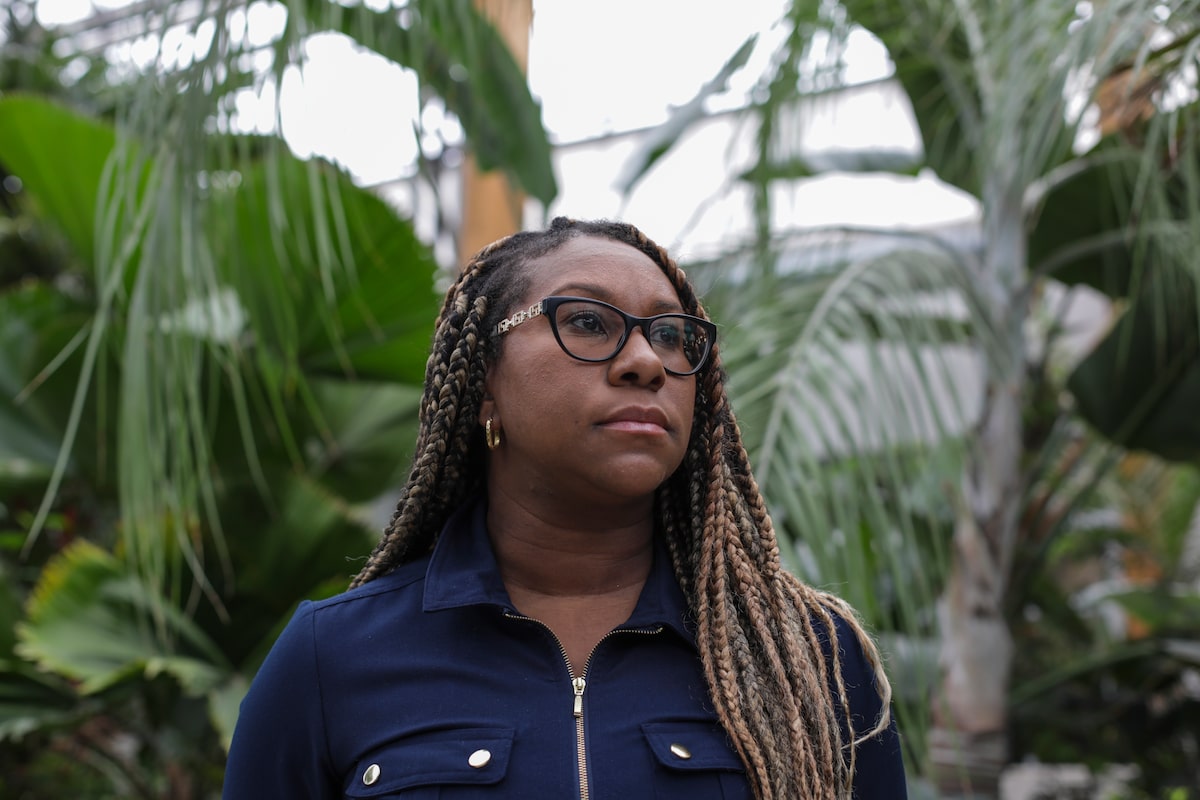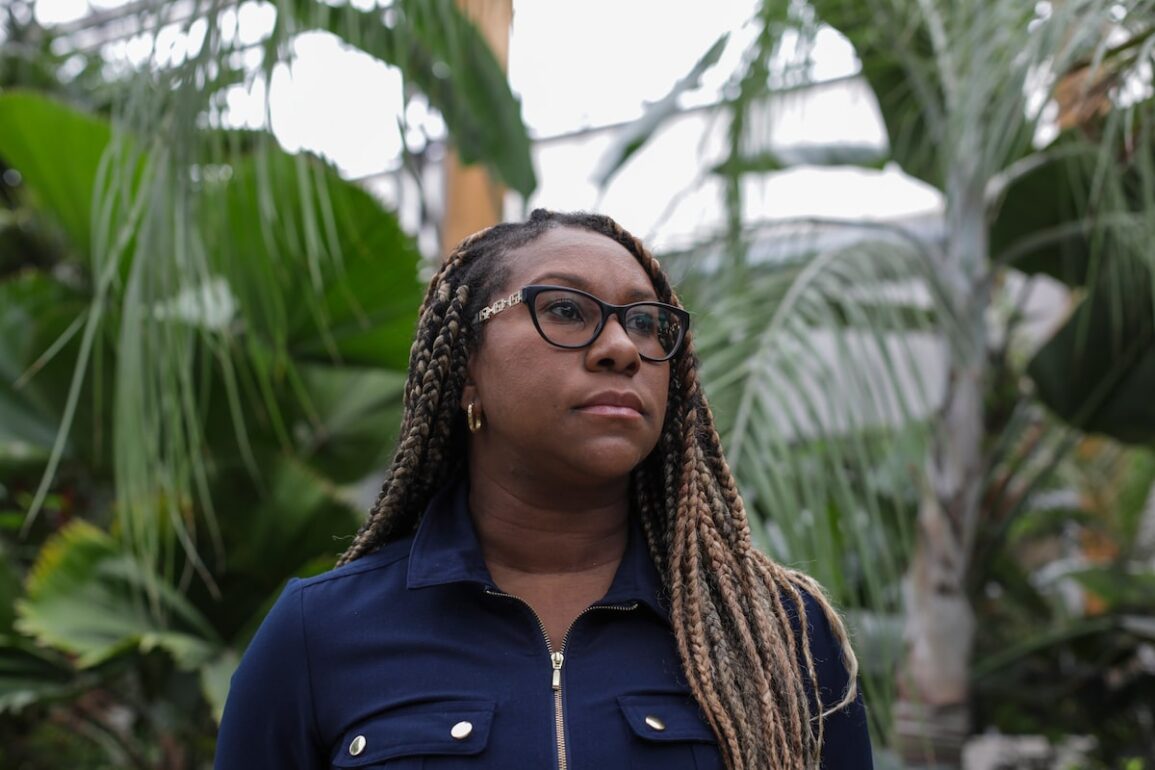
Amie Archibald-Varley, photographed at Gage Park in Hamilton, Ont., says her fear of failure compounded the mental health impacts of being bullied at a former job.Alex Jacobs-Blum
Amie Archibald-Varley remembers being bullied by her boss to the point that she would hide in her office.
“I would hear her coming down the hallway, and I would turn off the lights in my office or hide underneath my desk to the point where I was having panic attacks,” says Ms. Archibald-Varley, a nurse, educator and mental health advocate based in Kitchener, Ont. Though she tried to stand up for herself, the yelling and disrespectful language were relentless. “I had to take a mental health leave from work. It was probably the worst time in my entire life.”
Ms. Archibald-Varley’s feelings of anxiety and fear were intensified because she felt that as a nurse and a Black woman, failure wasn’t an option.
“You’re working with people, and making a mistake can be fatal,” she says. “There’s a level of perfectionism in health care, particularly as a woman of colour. I had to be even more perfect than my peers because I felt watched and scrutinized more.”
No one wants to fail at work, but for many Black women professionals, the fear of failure is magnified. In addition to facing personal setbacks, Black women may feel they need to represent their communities and break barriers in unwelcoming environments. The harsher scrutiny and pressure to succeed can take a heavy toll on their mental health.
‘Setting me up to fail’
Originally from Mozambique, financial professional Ana Mesa moved to the Toronto area five years ago to reset her career. She got a job at a bank in capital markets where she was paired with a difficult analyst.
“I remember trying my best to follow every rule,” she recalls. “[The analyst] started giving me random pieces of assignments and I would tackle them. Then that analyst would forget what he [had] asked me to do. He’d say, ‘Oh, but I asked for Y,’ but he [had] asked me for X.”
Ms. Mesa asked her colleagues for help in managing the analyst, and they advised her to send follow-up emails after every conversation “to make sure everyone is on the same page.” It didn’t help. Ultimately, it was Ms. Mesa’s word versus the analyst.
“When the time came, and the feedback was collected, he basically said that I wasn’t up for the task. I know for sure he was setting me up to fail.”
Some say that the burden of representation can add an additional layer of pressure, with Black professionals worrying that one misstep could close doors for others.
“You have this fear that if you fail as the first one and the only one, you’re not only jeopardizing your future opportunities, but you’re making it so that no other Black woman is going to be able to come behind you,” says Lerato Chondoma, who is originally from Lesotho and now based in Vancouver, formerly associate director at the Indigenous Research Support Initiative at the University of British Columbia.
Anxiety and depression
To keep the fear of failure at bay, many Black professionals work harder, trying to achieve more and stressing out about mistakes their peers aren’t penalized for. A 2022 survey by U.S. consulting firm Every Level Leadership found that 66 per cent of Black women said they did not feel emotionally safe at work. Extra stress can impact Black women’s mental and physical well-being, manifesting as anxiety, lack of sleep and appetite, heart palpitations, headaches and depression. It can require them to spend money on therapists and career coaches to help them navigate the workplace.
Chi-Chi Egbo, who founded her career development consultancy after burning out in the corporate world, says constant resiliency can be more harmful than helpful.Supplied
“When you have to be resilient every second, it gets exhausting,” says Chi-Chi Egbo, a certified career strategist and speaker who founded Workthrough, a career development consultancy, after burning out in the corporate world.
“We have to play up to this strong Black woman ideal,” she explains. “I’m not here to be your superwoman. I’m here to be a woman that has ups and downs, prioritizes herself, changes again, evolves, and gives herself space to grow and learn. I realized that resiliency was actually more harmful to me than helpful, because it was harming my body and my mental health. If I were to still stay in that situation, that would be failing myself.”
Eusis Dougan-McKenzie, executive officer, corporate services at the Waterloo Region District School Board, recalls a shocking statement a vice-president made during a job at a crown corporation. “This person was like, ‘I can’t believe they hired you to be the face [of the organization].’ At that time, I was still in my career girl Barbie stage where everything was always dry cleaned and ironed, and my manicure was always very fresh. My hair was chemically treated and straightened, and everything was always perfection. And yet, someone felt comfortable saying that to me.”
Getting into the office early and leaving late to prove herself, Ms. Dougan-McKenzie didn’t realize she was experiencing anxiety and depression. She thought she was okay because she was immersed in this idea of perfection, though her sleep was disturbed.
“I think I went through three or four therapists until I got to the fifth one. He said, ‘You’re so good at masking that you’re out-thinking the people who are trying to help you. But you’re not okay. Night terrors are not okay.’”
Pushing back, finding support
While the immense pressure not to fail remains, many Black professionals are pushing back against the idea that failure is something to be feared. Dawn Sancho, an HR professional with more than 20 years’ experience, points out that failure is integral to innovation.
“People learn more from the bumps in the road than they do from smooth sailing,” she says. However, Ms. Sancho also believes employers need to take a close look at the people leaders in their organizations to ensure they are treating Black employees fairly and equitably.
Rachel Baptiste of Lumen Consulting Group says that career development programs for Black employees need to be intentional and long-term to make real change.Supplied
Transparency around promotions and talent development will help ease employees’ fear of failure, says Rachel Baptiste, founder and CEO of Lumen Consulting Group, an executive coaching firm.
Ms. Baptiste also wants organizations to commit more resources to develop Black talent and accelerate their career progression. “It has to be intentional. It has to be long-term. It has to be sustainable to really make changes in workplaces,” she says.
While the onus is on organizations to create workplaces free from discrimination and racism, many Black professional women also talk about creating a network of supportive people to lean on. “Create your own personal board of advisers,” says Daisy Wright, chief encouragement officer at The Wright Career Solution and a certified coach. “[Then], you know you have this little hub to go to, to rest your shoes on, to say, ‘Listen, today has been rough.’”
There is also value in sharing stories to find support, connection and your own voice. Ms. Archibald-Varley has been sharing her experiences through her work as a journalist, speaker and co-author of a best-selling book, ‘The Wisdom of Nurses’, with Sara Fung. The pair created a podcast called ‘The Gritty Nurse’ to discuss work and mental health issues in health care.
“It was about telling my story and knowing I couldn’t have been the only one – other people might have had this experience,” she says.
But there comes a time when you may need to recognize that it just makes sense to move on, says Ms. Baptiste.
“If you’re planted in an environment or soil that is toxic and eroding your mental health and well-being, it might be time to replant yourself.”
Interested in more perspectives about women in the workplace? Find all stories on The Globe Women’s Collective hub here, and subscribe to the new Women and Work newsletter here. Have feedback? E-mail us at GWC@globeandmail.com.



